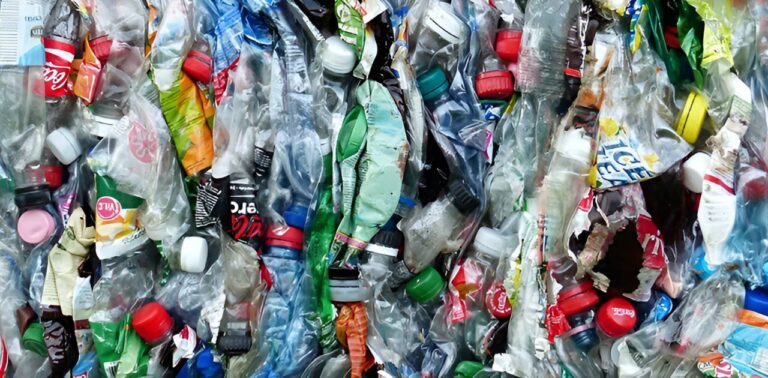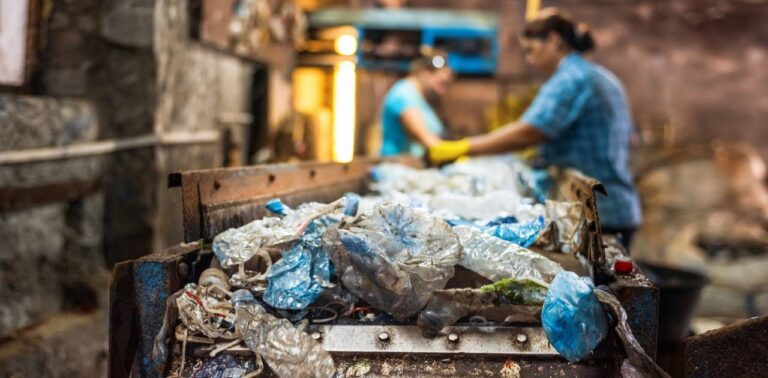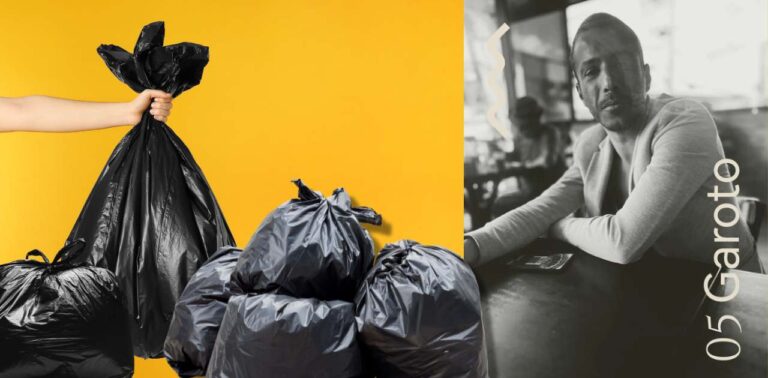PVC recycling plays a crucial role in preserving the environment and developing a circular economy. PVC, or polyvinyl chloride, is one of the most widely used plastics in the world, present in a wide range of products, from packaging and pipes to shoe soles and window frames. The advantage of PVC compounds is that they are 100% recyclable, whether by physical, chemical or energy recycling methods. In this post, we will explore the different PVC recycling processes, their advantages and how they contribute to environmental sustainability.

Mechanical Recycling: The Most Common Method
Mechanical recycling is the most common method for recycling PVC and involves transforming the material into new products through physical processes. This process begins with selective collection, where PVC products are separated from other recyclable materials. Once collected, PVC items are ground, washed and treated to remove impurities, and are then reprocessed into different forms, such as granules or powder. These recycled materials can be reused in the production of a variety of new products, such as electrical conduits, flooring, shoe soles, and benches.
Mechanical recycling is widely used in various industries due to its efficiency and the fact that the resulting products have a quality comparable to items made from virgin PVC. However, the success of this process depends on several factors, such as the organization of selective collection, the social impacts and costs involved, as well as the local ecological balance.
Success Stories in Mechanical Recycling
PVC recycling has yielded remarkable results in a variety of applications. For example, PVC packaging can be transformed into drainage pipes or textile fibers after undergoing appropriate treatment. Used PVC flooring is recycled to form the base layer of new products, and flexible PVC materials are converted into shoe soles. Used frames and pipes can also be reintroduced into their original production cycles. In addition, polymer blends with PVC are used in the production of screens and fences, demonstrating the versatility and reuse potential of this material.
Chemical Recycling: Innovation and Future Potential
While mechanical recycling is effective, it is not the ideal solution for all PVC waste, especially those that contain other materials such as electrical cables, tarpaulins, or mixtures with other plastics. This is where chemical recycling comes into play as a promising alternative. This process involves breaking down the polymer chains of PVC to return it to its basic raw materials, such as gases and oils.
During the chemical recycling process, the presence of PVC in the mixture can release chlorine in the form of hydrochloric acid, which can be separated and used to produce salts. This approach not only recovers PVC in a nearly pure state, but also allows other valuable chemical components to be recovered. Although still in the development and study stage, chemical recycling of PVC represents significant hope for dealing with more complex plastic waste that is difficult to recycle by mechanical methods.
The Vinyloop® Process: A Second Life for PVC
One of the most notable innovations in PVC recycling is the Vinyloop® process. This advanced technology solves one of the main challenges of PVC recycling: separating PVC from its additives and other materials. The Vinyloop® process is a closed system that uses a recyclable solvent to dissolve the PVC. After the material is ground, the PVC is separated, purified and dried, generating a minimal amount of waste, which is then properly treated.
Vinyloop® is an effective solution for recycling PVC compounds that would otherwise be difficult to process, ensuring that the material can be reused in new products with the same quality as virgin PVC. This process not only improves the efficiency of PVC recycling, but also contributes to environmental sustainability by reducing the need for new raw material extraction and minimizing waste.
Energy Recovery: The Limit of Recyclability
While mechanical and chemical recycling offer solutions for many types of PVC waste, not all materials can be recycled economically or efficiently. In cases where traditional recycling is not feasible, energy recovery has emerged as a useful alternative. This process involves incinerating PVC to generate energy by harnessing the material’s calorific value.
However, PVC incineration requires specific precautions due to the material’s chlorine content, which can generate hydrochloric acid during combustion. To mitigate this impact, the resulting gases need to be treated with advanced emission control technologies. Despite these challenges, energy recovery represents a viable complementary solution for treating PVC waste that cannot be recycled in other ways.
Economic and Environmental Benefits of PVC Recycling
PVC recycling is not only beneficial to the environment; it also represents a significant economic opportunity. By repurposing PVC into new products, industries can reduce their production costs and decrease their reliance on virgin raw materials, contributing to a more sustainable and circular economy. In addition, PVC recycling helps reduce the amount of plastic waste that ends up in landfills or the environment, reducing the environmental impact of this durable and long-lasting material.
Adopting PVC recycling practices can also create jobs and foster the development of innovative technologies. As industries invest in more efficient PVC recycling and recovery methods, new markets and business opportunities emerge, driving sustainable economic growth.
The Future of PVC Recycling
The future of PVC recycling depends on continued technological innovation and the commitment of industries and governments to promote sustainable practices. The evolution of methods such as chemical recycling and the Vinyloop® process promises to expand the possibilities for reusing PVC, even for more complex wastes. As these technologies advance, it is possible that PVC recycling will become even more efficient and affordable, allowing more materials to be recycled and less waste to be discharged into the environment.
Public awareness and encouragement of selective collection programs also play a key role in the success of PVC recycling. When consumers and businesses work together to ensure that PVC products are recycled properly, the positive impact on the environment and economy is amplified.
Check out other interesting facts about recycling clicking here.
Learn how to make art by recycling, Click here.
Summary




Hello good morning, I work with material such as shoe soles, PVC and all PVC material, PET, aluminum, copper, metal, plastics and scrap iron. I need a buyer. My cell phone number is 11 9659 65026. Re: 3974 7173. I supply all over Brazil.
Call me on WhatsApp to buy PVC scrap 11 982052493 or call Tim 85 996055327
Purchased Rigid and Semi-Flexible WHITE PVC, for lining and furniture corner tape for extrusion.
49 3433 9009
Good afternoon,
I have Rigid PVC available (waste from the production of cards and badges)
Tel.: 21-2663-7128
Hello Natália, do you still have material about cards available?
Good afternoon, Natalia. I use this type of material without a magnetic stripe and would like to hear from you for details. 11-983818520
Good morning, I would like to know if your company granulates PVC canvas.
Do you know that PVC tarpaulin is recycled?
I recycle PVC, how hard is your canvas?
Hello
I have colored semi-rigid PVC material in coils, material that makes sequins, it weighs approximately 5 tons.
I have PVC cards with a strip for recycling.
about 1000.
Where can I correctly dispose of this material in SP?
Please search in: http://setorreciclagem.com.br/reciclagem-maquinas-equipamentos
Good morning, do you still have the material?
And how much is left over per week?
What city are you in?
Contact: (11) 2821-2822
wathsapp 9.6462-7469. Talk to André
Grateful.
Rafael, the number mentioned is in units or in weight, if it is in weight I am interested.
I have a company that manufactures coaxial cables, which generates a lot of virgin PVC waste.
I would like to know who buys this material, as I have about 800 kg, and I have no idea what to do.
Thanks!
Search our search area to find PVC buyers:
http://setorreciclagem.com.br/reciclagem-maquinas-equipamentos
Good morning, do you still have the material?
And how much is left over per week?
What city are you in?
Contact: (11) 2821-2822
wathsapp 9.6462-7469. Talk to André
Grateful.
Good afternoon, do you still have this material?
I'm interested, my phone number is 11. 2821-2822 / 9. 6462-7469
Hi Alexandre, where are you from? I would like to get a sample of your material for my clients to try.
Can you tell me the hardness of the material? I'm interested... WhatsApp 11 959817147
I have about 900kg of PVC tarpaulin, the kind used in election propaganda. I need to sell them. Does anyone buy them? Or can you recommend one? My WhatsApp is 37 988444650. Thank you.
Ricardo, do you still have the material? Which city is code 37 from? I am available to pick it up. Please contact me.
I work with buying and selling PVC scrap.
I buy and sell.
I'm available
I have rigid PVC for sale, black and gray, if anyone is interested, I am available.
I buy and sell PVC... for sandals and soles, do you have any???
I buy rigid gray-black PVC
047 99761231
Buy rigid PVC black gray red white tel 047 97375034.zap
Buy rigid PVC black gray red white zap 047 97275034
I buy rigid PVC extrusion in black, gray, red, white, tel. 47 9727 5034
47 34630479
I need rigid PVC, red, black, gray, white
Tel 47 32275983 cell 47 97276045
Urgent
Send photo. I buy gray white black red rigid PVC Zap 047 97275034
I buy your PVC scrap 16 996259980
I am a consumer, get in touch
I need rigid PVC in gray, black, white, red
How much do you pay for gray?
Good evening, Caio!
I have about 1 ton of corrugated and flat electrical conduit pieces…are you interested?
Do you know where I can buy it in Santos?
I have PVC pipes available cut in various sizes, contact (17) 99642-0316
Good afternoon friend, I have PVC milling in Mirassol, I buy PVC in large quantities, white, blue and brown 17 991666800 0u 991431290
Send a photo
Te. 047 97275035
I buy PVC, crystal and black, PP, PS and polycarbonate 11 986556372
I BUY WHITE RIGID PVC, ANY QUANTITY. IN POWDER OR GRANULATED. MY CONSUMPTION IS 50 TONS/MONTH. MY TELEPHONE NUMBER IS (035) 9 – 8858 7066. THANK YOU.
I have about 200 tons of PVC tarpaulins and PVC upholstery (PVC C/POLYESTER). Who recycles this material? My number (92) 99399-8970 is live and 98411-7800 is clear.
I BUY RIGID PVC IN LARGE QUANTITIES MONTHLY CONSUMPTION OF 100 TONS I NEED TO INCREASE PRODUCTION 17 991431290 17 991666800
Hi Alexandre, where are you from? I would like to get a sample of your material for my clients to try.
I buy flexible PVC in crystal, white and colored.
Above 7000 tons crystal paid R$ 3.40
Above 7000 tons colored paid R$ 1.9
Above 7000 tons white paid R$ 2.10
Note: only clean post-industrial material, we do grinding, sawing and granulation labor.
11 4232-1339/1194773-4418/99826-1381
ID 9*2250 Mauricio
Good morning Mauricio, do you have anything made of PVC FLEX for sale at a good price? Hardness 50/55 or recycled.. 11 959817147 WhatsApp
Does anyone have crystal PVC for sale? SP and MG, please buy.
I have black PVC available for sale, about 20 tons. If interested, please contact me via the registered email. Thank you.
Do you have a phone number and what is the price range? WhatsApp 16 996259980
Good morning, I'm interested in your material, what's your contact?
Seeing –
Semi-rigid PVC in crystal and cinnamon tones (pigmentation in cinnamon color only)
Please get in touch [email protected]
What is the hardness of the material? I'm interested. 11 959817147 WhatsApp
consumption approx. 10 tons of semi-rigid PVC in the production of heat shrink films.
11-983818520
We are in RS, we have PVC-based fabric scraps from the projection and banners line, I would like to know if anyone acquires this material. 51-82331144
Good morning, I work with straps for flip-flops and I buy flexible PVC hardness 50/55 and recycled flexible PVC with the same hardness. If anyone has a good price for this material, please get in touch. 11 959817147 tim / Whatsapp
Good evening David, how much do you pay for flexible PVC? I have 1 ton. Can I supply a fixed quantity per month? My phone number is DD 13 78083179 or WhatsApp is DD 13 991345437. Talk to Claudio.
I have approximately 12 tons of flexible PVC in various colors, ground without any contamination because it was selected for grinding and there are also unground colors, black, blue, green and white, it is in Curitiba, contact by cell. 041 9950 4433 with watts
Good evening, I have some clean white PVC tarpaulins left over, if anyone is interested, my number is (11)97069-1550.
Good morning, is anyone interested in purchasing ground and bonded white PVC lining? Please send an email:
[email protected] I'm from the state of Rio Grande do Sul.
Hello, I'm from Rio de Janeiro, I work with recycling and I buy PVC from other deposits and from collectors, I want to contact buyers of PVC and Styrofoam, in large quantities, from any state
I buy scrap rigid PVC, I am located in Guarulhos-SP
I await contact
I BUY GROUND PVC (PIPES AND LINING ONLY) WE ARE FROM RECIFE PE, PLEASE CONTACT US AT 81 3545-8588
I have 200 kg of rigid PVC. Is anyone interested? I'm in São Paulo Capital.
We have rigid PVC waste in all colors for sale.
Who is interested?
tele 31 3075-8219 / 31 9 8434-1257
Afternoon
I have 40 tons of PVC from ground stretch, granulated and ground waste, cinnamon
silvio 62 984628029
I buy Rigid PVC scrap, please contact me
Rose 11-95863-3530
I buy PVC scrap for soles, please get in touch.
Tel: (83) 3337-3500 / 99127-7722
I would like to know if anyone is interested in semi-rigid PVC? Those interested can contact me at 35-988448970. Best regards.